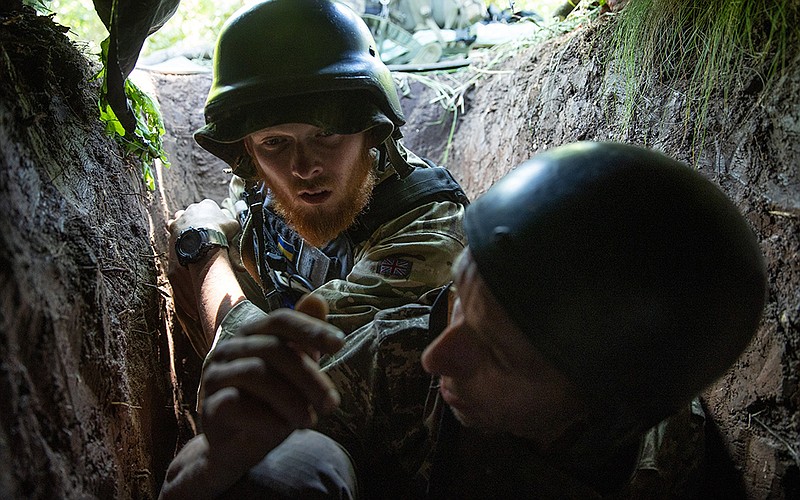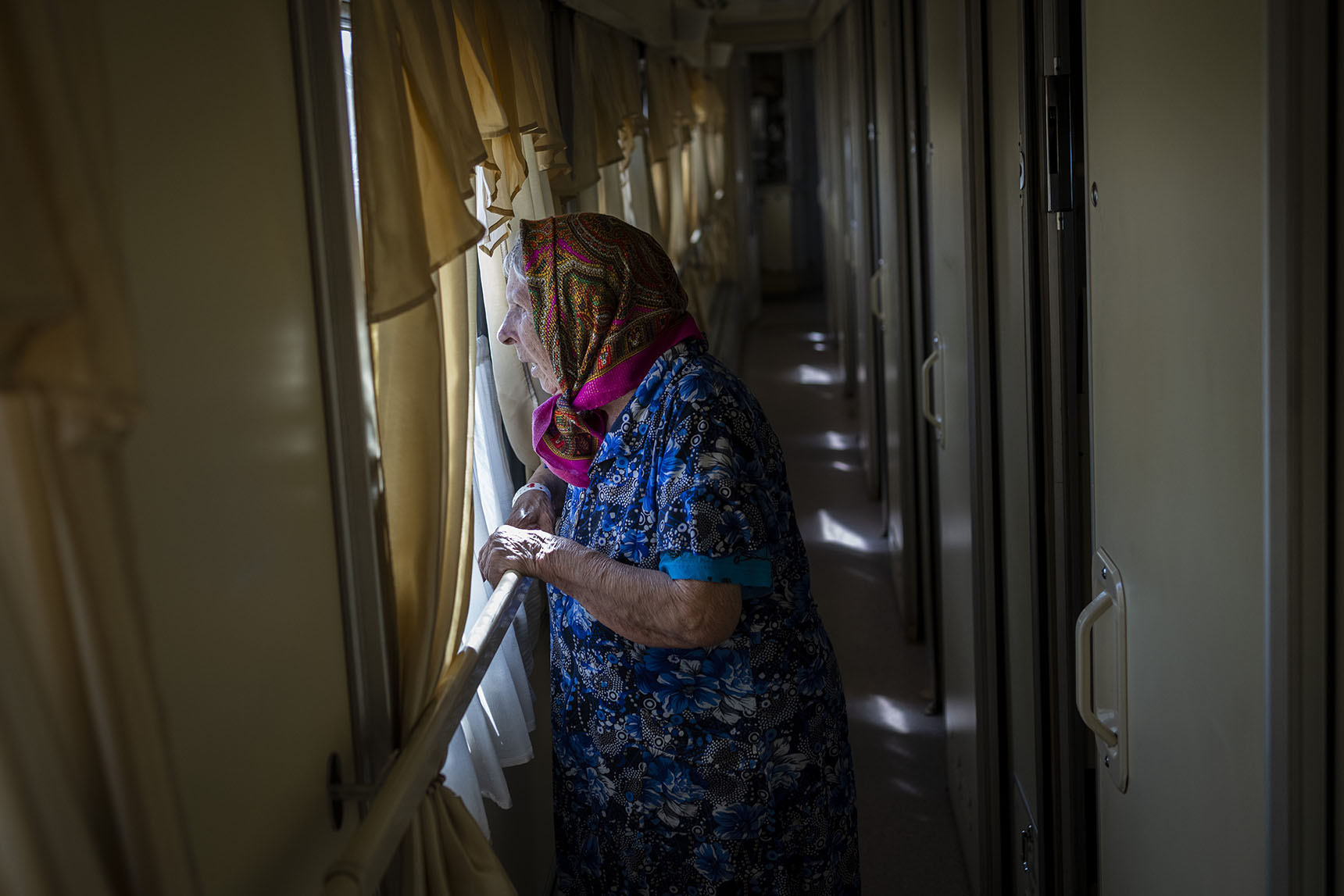KYIV, Ukraine -- As Russia's invasion of Ukraine grinds into its fourth month, officials in Kyiv have expressed fears that the specter of "war fatigue" could erode the West's resolve to help the country push back Moscow's aggression.
The U.S. and its allies have given billions of dollars in weaponry to Ukraine. Europe has taken in millions of people displaced by the war. And there has been unprecedented unity in post-World War II Europe in imposing sanctions on President Vladimir Putin and his country.
But as the shock of the Feb. 24 invasion subsides, analysts say the Kremlin could exploit a dragged-out, entrenched conflict and possible waning interest among Western powers that might lead to pressuring Ukraine into a settlement.
Ukrainian President Volodymyr Zelenskyy already has chafed at Western suggestions he should accept some sort of compromise. Ukraine, he said, would decide its own terms for peace.
"The fatigue is growing, people want some kind of outcome [that is beneficial] for themselves, and we want [another] outcome for ourselves," he said.
An Italian peace proposal was dismissed and French President Emmanuel Macron was met with an angry backlash after he was quoted as saying that although Putin's invasion was a "historic error," world powers shouldn't "humiliate Russia, so when the fighting stops, we can build a way out together via diplomatic paths."
Ukrainian Foreign Minister Dmytro Kuleba said such talk "can only humiliate France and every other country that would call for it."
Even a remark by former U.S. Secretary of State Henry Kissinger that Ukraine should consider territorial concessions drew a retort from Zelenskyy that it was tantamount to European powers in 1938 letting Nazi Germany claim parts of Czechoslovakia to curb Adolf Hitler's aggression.
Although Zelenskyy has inspired much of the world with his wartime leadership, his preparation for the invasion -- or lack thereof -- has been controversial.
In the weeks before the war began, Zelenskyy publicly bristled as Biden administration officials repeatedly warned that a Russian invasion was likely.
President Joe Biden said Zelenskyy "didn't want to hear it" when American intelligence gathered information in February that indicated Russia was preparing to invade his country.
Speaking to donors Friday at a Democratic fundraiser in Los Angeles, Biden talked about his work to rally support for Ukraine as the war continues.
"Nothing like this has happened since World War II. I know a lot of people thought I was maybe exaggerating. But I knew we had data to sustain" that Putin "was going to go in."
"There was no doubt," Biden said. "And Zelenskyy didn't want to hear it."
At the time, Zelenskyy was concerned that the drumbeat of war was unsettling to Ukraine's fragile economy.
Kyiv wants to push Russia out of the newly captured areas in eastern and southern Ukraine, as well as retake Crimea, which Moscow annexed in 2014, and parts of the Donbas under control of Kremlin-backed separatists for the past eight years.
Every month of the war is costing Ukraine $5 billion, said Volodymyr Fesenko, political analyst with the Penta Center think tank, and that "makes Kyiv dependent on the consolidated position of the Western countries."
Ukraine will need even more advanced weaponry to secure victory, along with Western determination to keep up the economic pain on Russia to weaken Moscow.
"It is obvious that Russia is determined to wear down the West and is now building its strategy on the assumption that Western countries will get tired and gradually begin to change their militant rhetoric to a more accommodating one," Fesenko said in an interview with The Associated Press.
PASS THE AMMUNITION
Zelenskyy said his army's ability to hold off Russian forces in the Donbas depends on the supply of Western weapons.
Ukrainian troops "are doing everything to stop the offensive, as much as they possibly can, as long as there are enough heavy weapons, modern artillery -- all that we have asked for and continue to ask for from our partners," he said Friday in his nightly video address.
He said Russia wants to destroy every city in the Donbas.
"Every city, that's not an exaggeration. Like Volnovakha, like Mariupol. All of these ruins of once-happy cities, the black traces of fires, the craters from explosions -- this is all that Russia can give to its neighbors, to Europe, to the world."
The war still gets prominent coverage in both the United States and Europe, which have been horrified by images of the deaths of Ukrainian civilians in the biggest fighting on the continent since World War II.
The U.S. continues to help Ukraine, with Biden saying last week that Washington will provide it with advanced rocket systems and munitions that will enable it to more precisely strike key targets on the battlefield.
In a New York Times essay on May 31, Biden said, "I will not pressure the Ukrainian government -- in private or public -- to make any territorial concessions."
Germany, which had faced criticism from Kyiv and elsewhere for perceived hesitancy, has pledged its most modern air defense systems yet.
"There has been nothing like it, even in the Cold War when the Soviet Union appeared most threatening," said Nigel Gould-Davies, senior fellow for Russia and Eurasia at the International Institute for Strategic Studies.
While he doesn't see a significant erosion in the "emphatic support for Ukraine," Gould-Davies said "there are hints of different tensions over what the West's goals should be. Those have not yet been clearly defined."
UNITY FRAYING
Europe's domestic concerns are nudging their way into the discourse, especially as energy prices and raw materials shortages start to take an economic toll on ordinary people who are facing higher electricity bills, fuel costs and grocery prices.
While European leaders hailed the decision to block 90% of Russian oil exports by the end of the year as "a complete success," it took four weeks of negotiations and included a concession allowing Hungary, widely seen as the Kremlin's closest EU ally, to continue imports. Weeks more of political fine-tuning are required.
"It shows that unity in Europe is declining a bit on the Russian invasion," said Matteo Villa, an analyst with the ISPI think tank in Milan. "There is this kind of fatigue setting in among member states on finding new ways to sanction Russia, and clearly within the European Union, there are some countries that are less and less willing to go on with sanctions."
Wary of the economic impact of further energy sanctions, the European Commission has signaled it won't rush to propose fresh restrictive measures targeting Russian gas. EU lawmakers are also appealing for financial aid for citizens hit by heating and fuel price hikes to ensure that public support for Ukraine doesn't wane.
Italy's right-wing leader Matteo Salvini, who has been seen as close to Moscow, told foreign journalists this week that Italians are ready to make sacrifices and his League supports the sanctions against Russia.
But he indicated that backing is not unlimited, amid signs the trade balance under sanctions has shifted in Moscow's favor, hurting small business owners in northern Italy who are part of his base.
"Italians are very available to make personal economic sacrifices to support Ukraine's defense and arrive at a cease-fire," Salvini said.
"What I would not like is to find us back here in September, after three months with the conflict still ongoing. If that is the case, it will be a disaster for Italy. Beyond the deaths, and saving lives, which is the priority, economically, for Italy, if the war goes on, it will be a disaster," he said.
FIGHTING IN EAST
Meanwhile, civilians fled intense fighting in eastern Ukraine on Friday as Russian and Ukrainian forces engaged in a grinding battle of attrition for key cities in the country's industrial heartland.
Mostly women, children and elderly residents left on a special evacuation train that departed from the city of Pokrovsk and headed west.
"We live on the front line now," said Svitlana Kaplun, whose family fled as shelling reached their neighborhood in the city of Krasnohorivka. "The kids are worried all the time, they are afraid to sleep at night, so we decided to take them out."
After a bungled attempt to overrun Kyiv, in the early days of the war, Russia shifted its focus to an eastern region of coal mines and factories known as the Donbas. The area borders Russia and has been partly controlled by Moscow-backed separatists since 2014.
The fighting there has led to mounting casualties and renewed pleas from Ukraine to the West for more weapons.
Podolyak, an adviser to Ukraine's president, told the BBC in an interview aired Thursday that the daily loss of 100 to 200 Ukrainian soldiers is the result of a "complete lack of parity" between Ukraine and Russia.
He said only more advanced Western weaponry will turn back the Russian offensive and force Moscow to the negotiating table.
Fighting in the Donbas has ground on for more than two months, and the slog continued Friday. A provincial governor said Russian and Ukrainian forces battled "for every house and every street" in Sievierodonetsk, a city that recently has been under steady attack.
Sievierodonetsk is in the last pocket of Luhansk province that has not yet been claimed by Russia or Moscow-backed separatists. The Luhansk and Donetsk regions together make up the Donbas.
Luhansk Gov. Serhiy Haidai told The Associated Press that Ukrainian forces retain control of the industrial zone on the edge of the city and some other sections amid the painstaking block-by-block fighting.
An envoy for the Luhansk People's Republic, a self-proclaimed separatist territory, reported Friday that some Ukrainian troops were trapped inside a chemical plant on the city's outskirts.
"All escape routes have been cut off," Rodion Miroshnik, Moscow ambassador for the unrecognized republic, wrote on social media.
"They are being told that no conditions will be accepted. Only the laying down of arms and surrender," he said.
Miroshnik echoed earlier claims by a Russian defense official that civilians remained on the plant's grounds. But he stopped short of reiterating allegations that Ukrainian forces were barring them from leaving.
As of Friday afternoon, there was no response from the Ukrainian side.
RUSSIAN ARTILLERY
Moscow kept up its artillery strikes on the neighboring city of Lysychansk and surrounding towns and villages, the Ukrainian military said. It also said that Russian troops were preparing to resume an offensive on the city of Slavyansk in the Donetsk region, south of Luhansk.
An adviser to Ukraine's president says artillery attacks devastated two Russian bases in the southern Kherson region, which has been under Russian occupation since early in the war.
Oleksiy Arestovych, in his regular online interview, said Friday that the attack on Stara Zburivka, a village along the Dnieper River, killed dozens, including a Russian army general and a general in the FSB intelligence service.
He said the FSB general was tasked with organizing a referendum on whether the Kherson region should join Russia. There was no immediate confirmation of the claim.
Ukraine has claimed to have killed about a dozen generals in the war, but only a few of the deaths have been confirmed.
Arestovych said a separate attack this week on a Russian base in Chkalove killed at least 200 troops, including Arabs, presumably from Syria. He said it was the first confirmed case of Arabs fighting with Russians in Ukraine.
He said in both cases the Ukrainian forces used 155mm howitzers supplied by the West.
Information for this article was contributed by Colleen Barry, Yuras Karmanau, Angela Charlton, Lorne Cook, Justin Spike, Aya Batrawy, David Keyton, Jill Lawless and Jamey Keaten of The Associated Press.
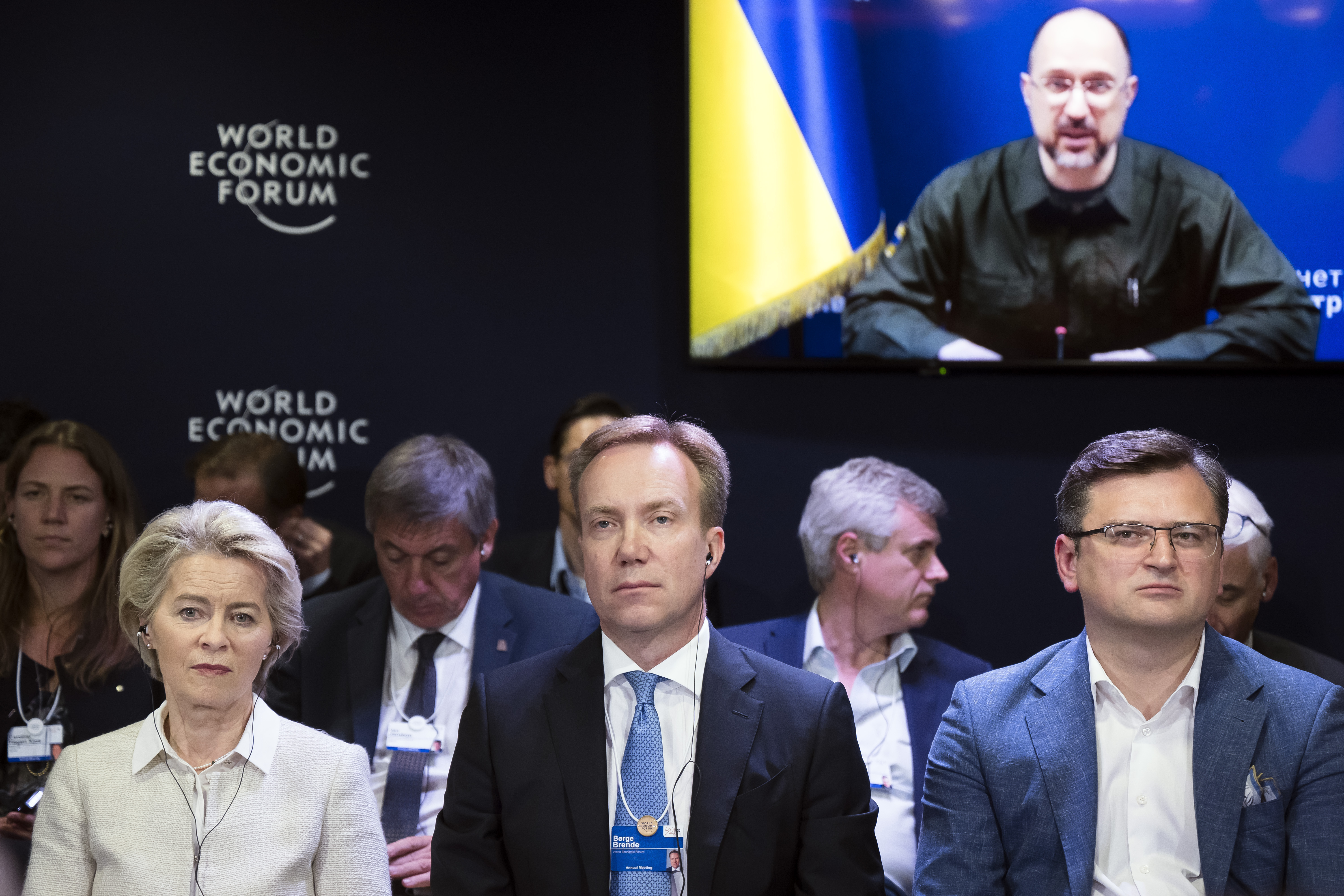 FILE - Ursula von der Leyen, President of the European Commission, Borge Brende, President, World Economic Forum and Dmytro Kuleba, Minister of Foreign Affairs of Ukraine listen to Denys Shmygal, Prime Minister of Ukraine, on screen, during a video meeting at the 51st annual meeting of the World Economic Forum, WEF, in Davos, Switzerland, Wednesday, May 25, 2022. As Russia’s invasion of Ukraine grinds into its fourth month, officials in Kyiv have expressed fears that the specter of “war fatigue” could erode the West’s resolve in helping the country push back Moscow’s aggression. (Laurent Gillieron/Keystone via AP, File)
FILE - Ursula von der Leyen, President of the European Commission, Borge Brende, President, World Economic Forum and Dmytro Kuleba, Minister of Foreign Affairs of Ukraine listen to Denys Shmygal, Prime Minister of Ukraine, on screen, during a video meeting at the 51st annual meeting of the World Economic Forum, WEF, in Davos, Switzerland, Wednesday, May 25, 2022. As Russia’s invasion of Ukraine grinds into its fourth month, officials in Kyiv have expressed fears that the specter of “war fatigue” could erode the West’s resolve in helping the country push back Moscow’s aggression. (Laurent Gillieron/Keystone via AP, File) FILE - Ukrainian President Volodymyr Zelenskyy addresses by videolink the opening plenary session hosted by Klaus Schwab, Founder and Executive Chairman, World Economic Forum, left, during the 51st annual meeting of the World Economic Forum, WEF, in Davos, Switzerland, on Monday, May 23, 2022. As Russia’s invasion of Ukraine grinds into its fourth month, officials in Kyiv have expressed fears that the specter of “war fatigue” could erode the West’s resolve in helping the country push back Moscow’s aggression. (Laurent Gillieron /Keystone via AP, File)
FILE - Ukrainian President Volodymyr Zelenskyy addresses by videolink the opening plenary session hosted by Klaus Schwab, Founder and Executive Chairman, World Economic Forum, left, during the 51st annual meeting of the World Economic Forum, WEF, in Davos, Switzerland, on Monday, May 23, 2022. As Russia’s invasion of Ukraine grinds into its fourth month, officials in Kyiv have expressed fears that the specter of “war fatigue” could erode the West’s resolve in helping the country push back Moscow’s aggression. (Laurent Gillieron /Keystone via AP, File)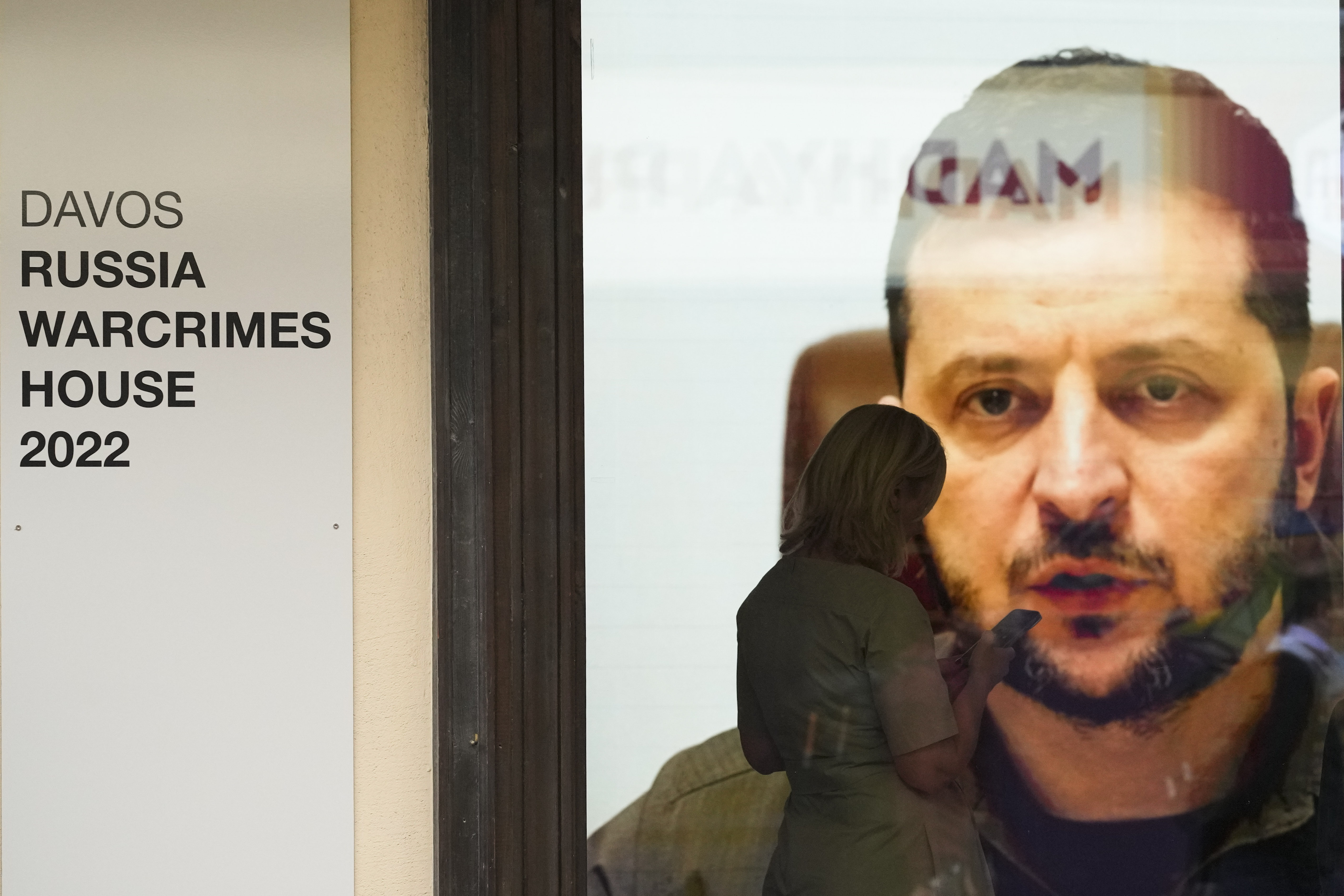 Ukrainian President Volodymyr Zelenskyy speaks on a screen inside a so-called Russian War Crimes House alongside the World Economy Forum in Davos, Switzerland, Sunday, May 22, 2022. As Russia’s invasion of Ukraine grinds into its fourth month, officials in Kyiv have expressed fears that the specter of “war fatigue” could erode the West’s resolve in helping the country push back Moscow’s aggression. (AP Photo/Markus Schreiber, File)
Ukrainian President Volodymyr Zelenskyy speaks on a screen inside a so-called Russian War Crimes House alongside the World Economy Forum in Davos, Switzerland, Sunday, May 22, 2022. As Russia’s invasion of Ukraine grinds into its fourth month, officials in Kyiv have expressed fears that the specter of “war fatigue” could erode the West’s resolve in helping the country push back Moscow’s aggression. (AP Photo/Markus Schreiber, File)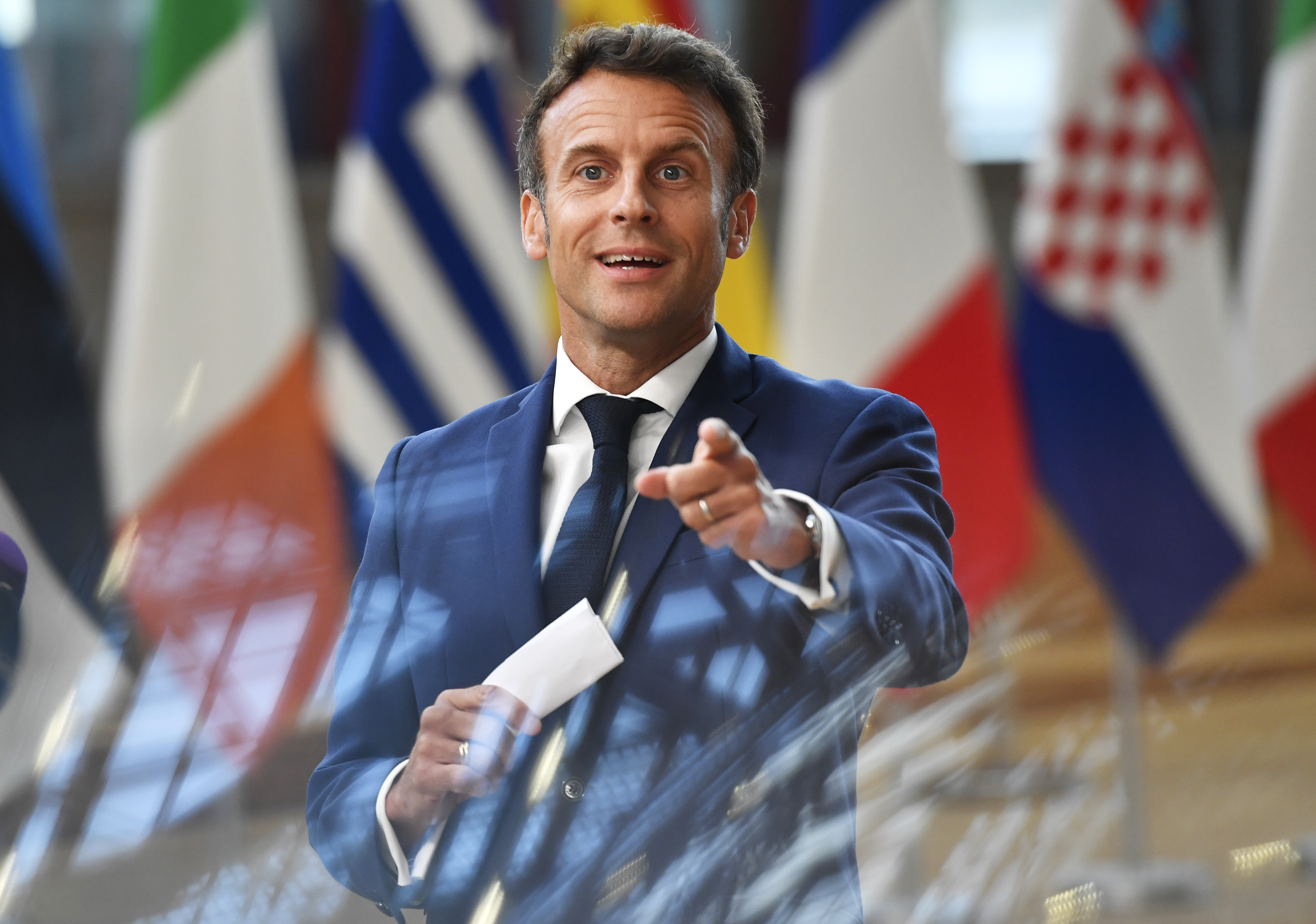 FILE - French President Emmanuel Macron speaks to media at the Europa building in Brussels, Tuesday, May 31, 2022. As Russia’s invasion of Ukraine grinds into its fourth month, officials in Kyiv have expressed fears that the specter of “war fatigue” could erode the West’s resolve in helping the country push back Moscow’s aggression. French President Emmanuel Macron was met with an angry backlash after he was quoted as saying that although Putin's invasion was a “historic error,” world powers shouldn’t “humiliate Russia, so when the fighting stops, we can build a way out together via diplomatic paths.” (AP Photo/Geert Vanden Wijngaert, File)
FILE - French President Emmanuel Macron speaks to media at the Europa building in Brussels, Tuesday, May 31, 2022. As Russia’s invasion of Ukraine grinds into its fourth month, officials in Kyiv have expressed fears that the specter of “war fatigue” could erode the West’s resolve in helping the country push back Moscow’s aggression. French President Emmanuel Macron was met with an angry backlash after he was quoted as saying that although Putin's invasion was a “historic error,” world powers shouldn’t “humiliate Russia, so when the fighting stops, we can build a way out together via diplomatic paths.” (AP Photo/Geert Vanden Wijngaert, File)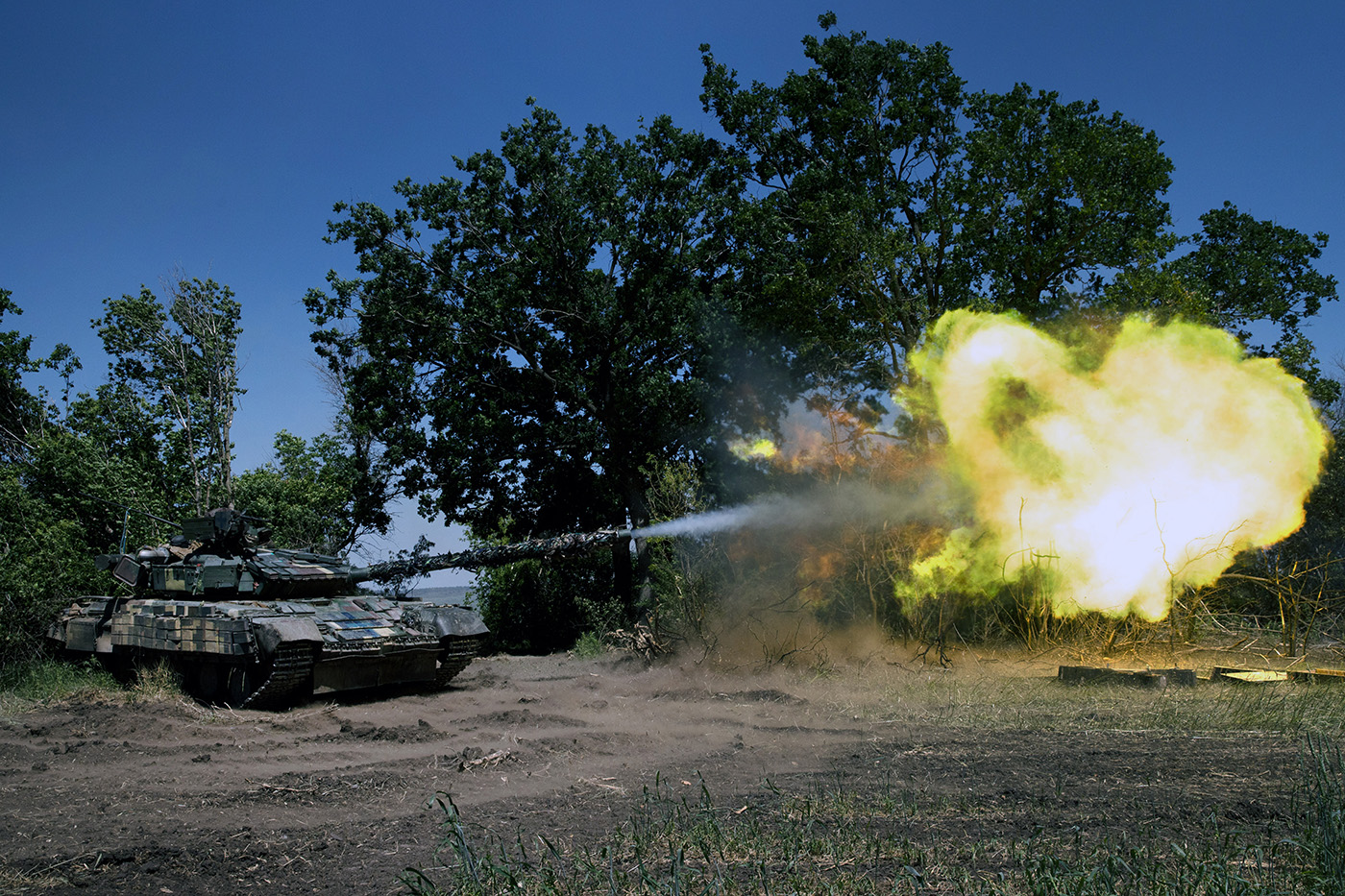 A Ukrainian tank fires on Russian positions Friday in the Donetsk region of eastern Ukraine. Officials said Russia was preparing to resume an assault on the city of Slavyansk in the region, while artillery attacks reportedly heavily damaged two Russian bases in Ukraine’s southern Kherson region. (The New York Times/Tyler Hicks)
A Ukrainian tank fires on Russian positions Friday in the Donetsk region of eastern Ukraine. Officials said Russia was preparing to resume an assault on the city of Slavyansk in the region, while artillery attacks reportedly heavily damaged two Russian bases in Ukraine’s southern Kherson region. (The New York Times/Tyler Hicks)Gallery: Images from Ukraine, month 4
